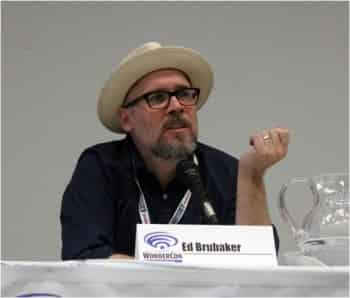
Ed Brubaker
Compression and decompression
“We don’t often spend enough time on ramifications in mainstream comics, so here was a place to build a whole storyline around them.” —Ed Brubaker (“The Ed Brubaker ‘Captain America’ Exit Interview,” David Brothers, comicsalliance.com, November 1, 2012).
Brubaker’s statement reminded us of a piece written by Renaud Pasquier (« “Homeland” met en scène le nouveau Jack Bauer de l’Amérique parano », Le Nouvel Observateur, September 29, 2012), in which he analyzes the first season of the TV series Homeland: ” However, this story won’t at all engage in a furious investigation fueled by the fateful ticking of the clock. What gives fiction its rhythm is time, not external or mechanical time, but something intimate and organic. The irregular and non-linear time of experience; the time of suspicions, doubts and hesitations; the time of emotions, thoughts and memories; but also, the time of delusions” [translation].
In an interview with Mark Waid, Tom Spurgeon used the word “decompression” to talk about Waid’s writing style (Interview # 22 – Mark Waid, www.comicsreporter.ccom, January 10, 2013). We like the image the word creates. We’d like to refine this a little and suggest there is an analogy to be made with the accordion: you need to let air into the instrument (decompression) in order to produce sounds (compressions). If our stories operate only in action mode (compression), they can no longer breathe, there is no longer time to come to understand the characters, their motivations, their evolution. Compression and decompression: that’s our recipe.
Making a plan and being able to deviate from it – Part I
At the end of his time at Marvel, where he mainly worked on the Captain America series, Ed Brubaker said the following: “I hoped for two years, and planned for three, because three years was about the longest I’d stayed on any other book. My pitch document had the first 12 issues mapped out, which I mostly stuck to, actually, and then sketched out the next year in broad strokes. I never imagined I’d go even 50 issues, let alone the I think 102 issues I did, counting mini-series and one-shots and annuals.” He also added, “More than anything, it was that each issue kept wanting to be longer or I kept feeling like I had more ideas and wanted to spend more time with the characters, and realized I was stopping myself from doing that with an arbitrary structure I’d imposed on myself” (“The Ed Brubaker ‘Captain America’ Exit Interview,” David Brothers, comicsalliance.com, November 1, 2012).
There are two opposing ideas here: the idea of a plan that guides the author, and the idea of the flexibility the writer must maintain to include new ideas or developments that hadn’t been originally anticipated. In our project, one of the ideas that just evolved like that was Votan’s identity. At first, he was going to remain mysteriously anonymous over a number of stories, if not all the way to the end, but ultimately, we dropped that concept, preferring instead to reveal his identity quickly, because this opened up more dramatic opportunities.
The Future of Comics in the Web Ara – Part II
Graeme McMillan regrets that the industry has become a niche market (“The Beauty of Digital,” www.newsarama.com, July 11, 2012). One of the reasons frequently cited for this is price. Brubaker is nostalgic for a time when comic books cost $2.99 and he thinks the price hike is a reason for declining sales (“CR Sunday Interview: Ed Brubaker,” www.comicsreporter.com, June 24, 2102). Brian K. Vaughan agrees and so he priced the first issue of the Saga series (which contained 44 pages) at $2.99 (David Uzurmeri, “Saga: Brian K. Vaughan and Fiona Staples Bring a Stellar Sci-Fi Comic into World, www.comicsalliance.com, March 14, 2012). Higher prices don’t allow consumers buy as many issues for their activity budget (“Marvel’s Axel Alonso Made Me Laugh this Morning,” www.comicsreporter.com, July 6, 2012). Between 2000 and 2010, the price of comics increased 77% in the US (“With Great Power Comes Great Financial Hardship,” www.comicboodaily.com, June 4, 2010). And on top of the higher price, many feel there is now less and less text in comics, which means they are much faster to read. That makes them very pricey for the amount of time readers get out of them (“Where Did all the Words Go?” www.comicbookdaliy.com, May 21, 2010).
Comics don’t just compete with other superhero series and manga but with other forms of entertainment. Because readers have lots of choices, it’s easy to cut part of their budget for comic books (Ed Campbell, “Are You Willing to Make a Cut,” www.comicbookdaily.com, March 24, 2012).
Continuity Doesn’t Mean Characters Can’t Be Transformed
In a previous comment on continuity, we cited a commenter who said that major characters have sometimes changed to the point of being unrecognizable. On this subject, Scott VanderPloeg said, “Batman can be a dark and gritty character, but can also be fun and light” (“What Happened? www.comicbookdaily.com, January 11, 2012). This phenomenon may be due to progressive intrusion of social trends into the storylines. However, what’s more destabilizing is a sudden personality reversal, which is most often due to a new writing team.
Many have said that continuity doesn’t stem from the story itself but from the writing team. Graeme McMillan highlighted that “Better continuity developing through the line” (“Is Continuity Really a Draw for Superhero Universes?” www.newsarama.com, July 26, 2012). And in an interview, Ed Brubaker confided that he was nostalgic for the time when a writer and illustrator could collaborate on dozens of issues and be free to develop more textured worlds (“CR Sunday Interview: Ed Brubaker,” www.comicsreporter.com, June 24, 2012).
On Tone
When Spurgeon interviewed Ed Brubaker (“CR Sunday Interview: Ed Brubaker,” www.comicsreporter.com, June 24, 2012) he offered this introduction to one of his questions: “When I read a bunch of your Captain America recently, I was surprised how somber it was. I don’t mean that it was depressing or sad, I mean serious and sober.”
We came across this sentence a long time after we’d started writing and we felt that it was in keeping with what we are trying to do. Our dialogue is imbued with restraint—some would even say banality, and we accept that. Our goal isn’t to write transcendent dialogue. Instead we want to convey ambiguous moods, as though the characters were unable to reconcile all the mysteries around them or all the lies they’ve told others and themselves.






